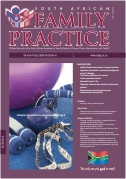Choosing, Changing or Adhering to a Registered Doctor in a Managed Care Plan: What Will it Take? A Qualitative Survey in Rural Mpumalanga, South Africa
Keywords:
doctor-shopping, managed care, continuity of care, traditional healer, satisfaction
Abstract
Background: The phenomenon of doctor shopping has not yet attracted the attention of managers in the South African healthcare sector. Satisfaction with services is known to be mediated by the personal connection inherent in interpersonal continuity with the provider. Such a connection hinges on the fulfilment of expectations of what a good doctor should be at a relational level. With the advent of managed care in South Africa, the restriction on doctor choice and use is being enforced. There is evidence that adherence to one doctor has clinical and financial benefits. Clinical benefits are related to continuity of care, whilst financial gains to the patient and the healthcare system are acquired mainly through better co-ordination of care to avoid inefficiency and wastages. This study explores the concept and context of a ‘good doctor’, a prerequisite for adherence to one doctor, among members of a health plan targeting the low income community in South Africa. Methods: This qualitative enquiry of what constitutes a ‘good doctor’ took place in the form of focus group discussions and key informant interviews and was conducted among members of a managed care health plan in Piet Retief, South Africa. The plan was designed specifically for the employed but uninsured population, a population group of strategic importance in the South African healthcare market. The participants in this study were purposively sampled to include a wide range of opinions about the characteristics of a good doctor. Results: The respondents looked for values in a doctor that range from fairness, lack of discrimination, autonomy, dignity, warmth and taking time to do a job properly. Generally, the participants expressed willingness to adhere to one registered doctor on condition that the doctor was a ‘good doctor’. The definition of a good doctor as provided by the participants was not based on strict technical/clinical criteria, but rather on the patients’ and the community’s recent experiences of care under that particular doctor. The typical good doctor is a popular, friendly person who does not discriminate along racial lines, listens seriously to anything presented to him or her and examines the patient properly. He/she takes the patient’s illness seriously, refers when necessary and gives sick leave that can be used to see a traditional healer. The determinants of the choice of doctor were practical (e.g. the cost), although many were humanistic and difficult to quantify (e.g. word of mouth from fellow patients; the attitude of the doctor toward people; the popularity of the doctor in the community). The specific needs of the respondents relating to traditional healing, migration and sick leave are not readily captured in a standard medical aid contract. Conclusion: Some characteristics of a ‘good doctor’ that are particular to the study population include emphasis on a non-discriminative approach, the value of understanding the patient, acceptance of traditional healing and the provision of sick leave when needed. This has important implications for the training of doctors (e.g. to expand the curriculum to include humanistic competencies) and the nature of a managed care contract. This article has been peer reviewed.
Published
2008-06-05
Section
Original Research
By submitting manuscripts to SAFP, authors of original articles are assigning copyright to the South African Academy of Family Physicians. Copyright of review articles are assigned to the Publisher, Medpharm Publications (Pty) Ltd, unless otherwise specified. Authors may use their own work after publication without written permission, provided they acknowledge the original source. Individuals and academic institutions may freely copy and distribute articles published in SAFP for educational and research purposes without obtaining permission.

